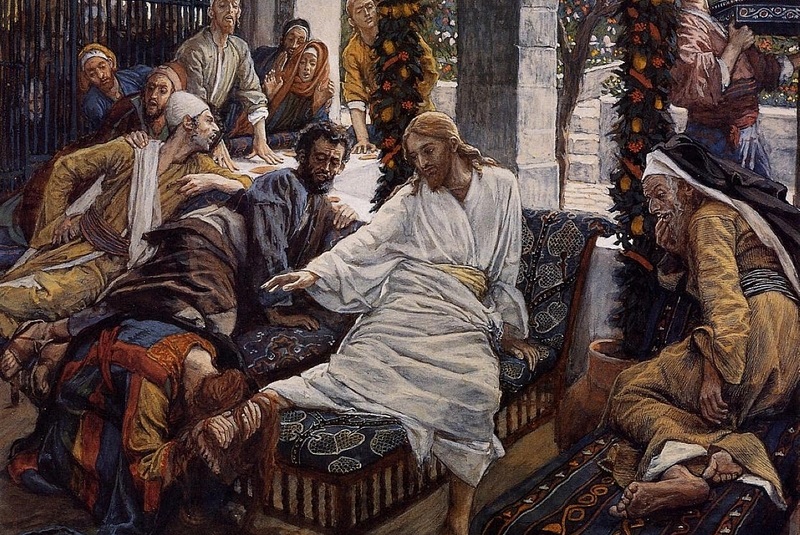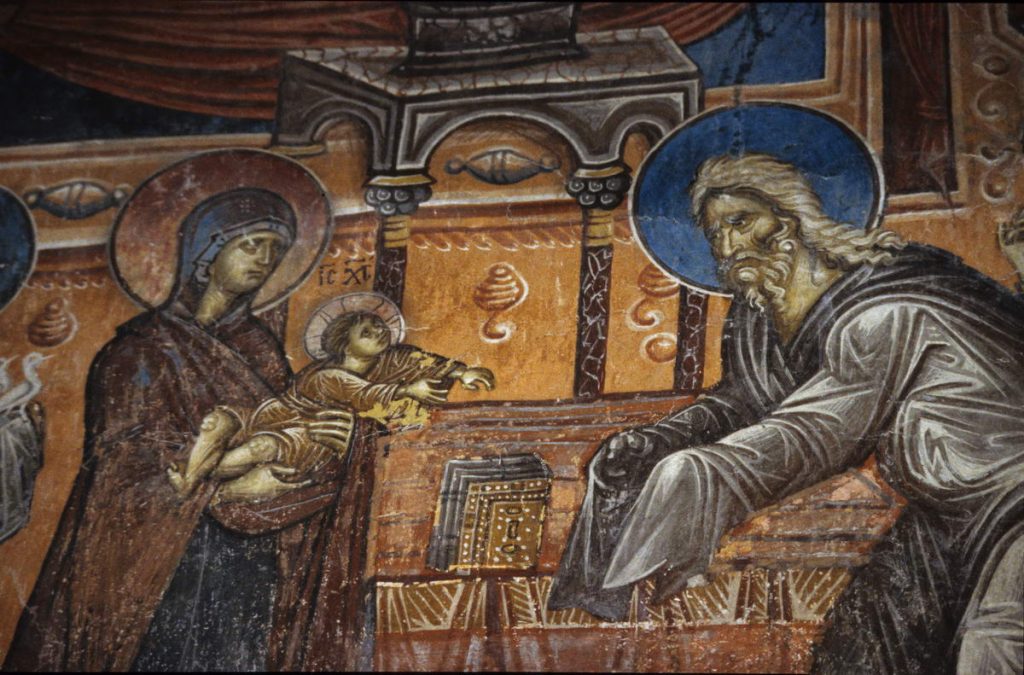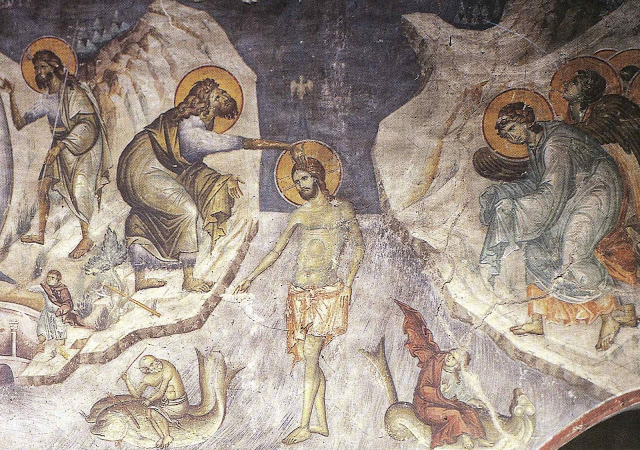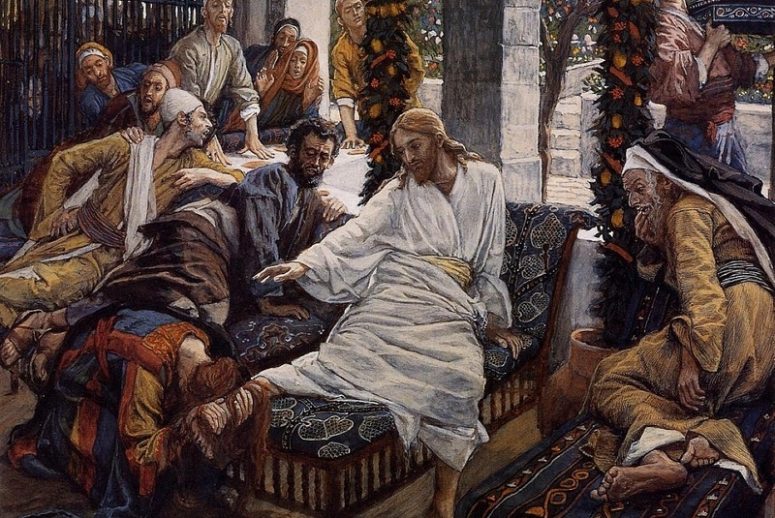
She who had anointed Christ with precious myrrh
Had foreshadowed the myrrh and aloes that Nicodemus brought.
– Synaxarion of Holy and Great Wednesday
The Holy Church recalls the last events of the Savior’s life, immediately preceding his Passion, during the Holy Week. The themes of the first three days of that week (Monday through Wednesday) serve as a kind of a bridge between the Lord’s Entry into Jerusalem and the Passion of Christ. The chants sung on these days convey those themes artfully and with profound prayerful insight. They can also be found in Gospel readings and are explored in detail in the Synaxaria of Lenten Triodion. Let’s have a look into the key images and Gospel stories of Holy Wednesday reflected in worship texts, namely the harlot anointing the Lord and the betrayal of Judas.
There were several occasions in the Savior’s life when a woman anointed him with myrrh, and those occasions are described in all four Gospels. The narratives of Matthew and Mark are parallel and describe one and the same woman (Matthew 26:6-13; Mark 14:3-9). Luke tells about a harlot who came into the house of Simon the Pharisee (Luke 7:36-50). Apostle John narrates about Mary the sister of Martha and Lazarus anointing Jesus’s feet, which allegedly happened prior to his Entry into Jerusalem (John 12:1-8). Holy Fathers differ in their opinions on how many women anointed Jesus’s feet or head. Thus, Saint Gregory the Dialogist believed that there was only one woman; Origen, followed by the author of the Synaxarion of Holy Wednesday, claimed that there were three different women. There are quite a few alternative opinions on how many women there were but in the end, the opinion of Saint John Chrysostom, the great interpreter, prevailed. St. John Chrysostom insisted that there were two women: the harlot described by the synoptic Gospels, especially Luke, and Mary the sister of Lazarus, mentioned by Evangelist John. The Chrysostom’s opinion found its reflection in church worship texts.
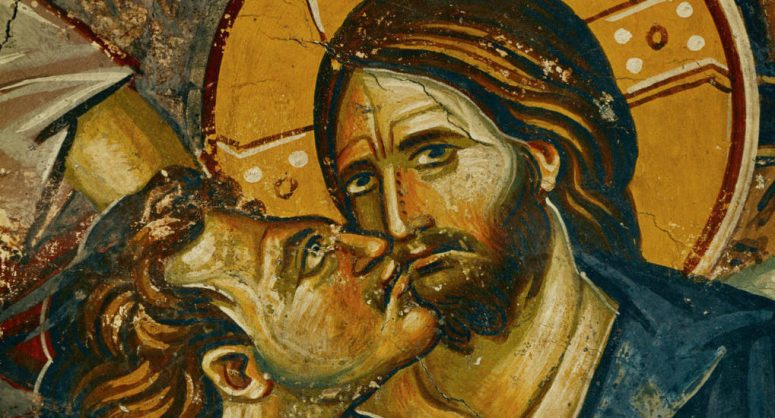
There are a number of Holy Wednesday chants that try to make sense of the anointing of the Savior’s feet with myrrh. Hymnographers use their favorite method and render the woman’s direct speech, in spite of the fact that the woman simply wept and didn’t say anything according to the Bible. We read, “Though I am rich in fragrances, I am poor in virtues. I bring what I have to Thee: Give me what you have and relieve me and forgive me, the harlot cries to Christ.” We read in the sessational hymn after the 1st Kathisma of the Holy Wednesday Matins that the Church compares the harlot with Apostle Judas who betrayed his Teacher and Lord for thirty silver coins, as prophesied by Prophet Zechariah. Judas had been awash with grace but he rejected it and wallowed in filth, selling You in his love of money. On the contrary, the harlot who washed the Lord’s feet with myrrh and tears was delivered from the stench of her evil deeds.
At the end of the Matins the Church ingeniously contrasts the harlot’s kiss of the Savior’s feet and Judas’s treacherous kiss, “Oh, the wretchedness of Judas! He saw the harlot kiss the footsteps of Christ, but deceitfully he contemplated the kiss of betrayal. She loosed her hair while he bound himself with wrath. He offered the stench of wickedness instead of myrrh” (The Lauds Stichera of the Holy Wednesday Matins). However, the wonderful troparion on Glory, Now and Ever of the Lauds, written by Nun Cassia, a brilliant hymnographer and the only woman whose hymns and stichera were included in worship books, is the veritable gem among the chants of Holy Wednesday. Nun Cassia likens the harlot to Eve and contrasts the repentance and courage of the sinful harlot to the shame and fear of Eve who hid from the Lord in the Paradise together with her husband Adam: “The woman had fallen into many sins, O Lord, yet, when she perceived Your divinity, she joined the ranks of the myrrh-bearing women. In tears she brought You myrrh before Your burial. She cried: “Woe is me! For I live in the night of licentiousness, shrouded in the dark and moonless love of sin. But accept the fountain of my tears, O You, Who gathered the waters of the sea into clouds! Bow down Your ear to the sighing of my heart, O You, Who bowed the heavens in Your ineffable condescension! Once Eve heard Your footsteps in Paradise in the cool of the day, and in fear she ran and hid herself. But now I will tenderly embrace those pure feet and wipe them with the hair of my head. Who can measure the multitude of my sins, or the depth of Your judgments, O Savior of my soul? Do not despise Your servant in Your immeasurable mercy!”
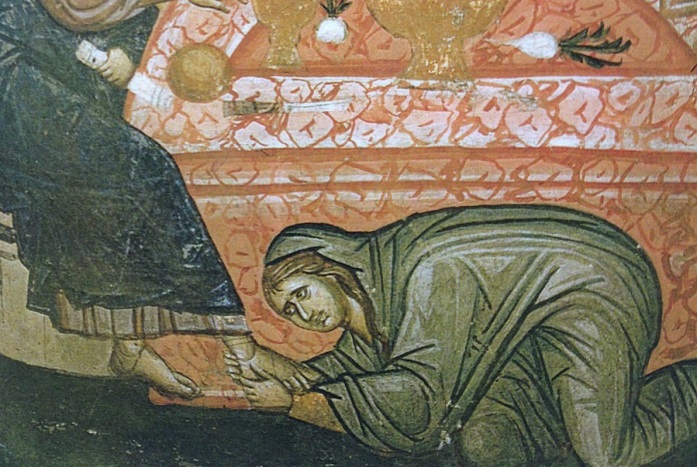
Holy Wednesday worship texts describe the Gospel events that happened just a couple of days before the three days of Easter with amazing insight and sublime style, highlighting the story of the repentant harlot who poured precious myrrh on the Lord’s feet and the contrasting decision of one of the apostles to betray his Teacher for thirty silver coins, the price of him that was valued (Matthew 27:9). This Gospel story gives us hope and at the same time serves as an serious warning to all people. It lets sinners, non-believers, and wretched ones hope that forgiveness is still possible, that the Lord is waiting for their repentance and is ready to forgive any sin and any failure. The Lord addressed the elders of the nation with the following words, Verily I say unto you, That the publicans and the harlots go into the kingdom of God before you. (Matthew 21:31). Yet, it’s also a warning to all people who think that they are close to the Lord, that they are the Lord’s favorite disciples, and who take the liberty to look down on apparent sinners. Harlots and other sinners can repent and go into the Heavenly Kingdom, while religious people who do not have the spirit of love and compassion can be cast away by Jesus Christ who came to save his lost sheep.

